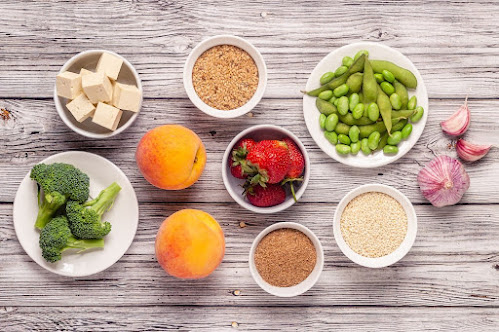5 Menopausal Gynaecologist-Approved Foods for a Healthy Diet
As women enter the menopausal years, it’s important to take special care of our bodies. One way to do this is by maintaining a healthy diet. To help us achieve this goal, gynaecologists have put together a list of foods that are especially beneficial to women in menopause. In this blog post, we’ll be looking at five menopausal gynaecologist-approved foods that you should add to your diet for optimal health.
1) Flaxseeds
Flaxseeds are an incredibly powerful superfood and should be part of any menopausal diet. Flaxseeds are packed with omega-3 fatty acids, which have been shown to help reduce inflammation and provide relief from hot flashes and night sweats. Flaxseeds are also a great source of fiber, helping to maintain a healthy digestive system.
They can be consumed in a variety of forms, including ground up and added to smoothies or yogurt, or even as an ingredient in baked goods. You can also try adding some flaxseed oil to your diet. Flaxseed oil is a great source of essential fatty acids and can help provide relief from the symptoms associated with menopause.
Overall, adding flaxseeds to your diet is a great way to boost your overall health during menopause. Be sure to consult with your doctor before starting any new diet or supplement plan.
2) Soy
Soy is a great source of plant-based protein, which is important for women going through menopause. Studies have shown that eating soy products can help with hot flashes and other symptoms associated with menopause. Soy also contains phytoestrogens, which are beneficial for helping the body adjust to hormonal changes. Additionally, soy contains high amounts of isoflavones, which can help to reduce the risk of osteoporosis.
When choosing soy products, look for those that are organic, non-GMO, and as close to their natural form as possible. Examples include edamame, tempeh, and tofu. For added convenience, you can also get ready-made soy-based foods such as veggie burgers, soy milk, and dairy-free yogurts. Be sure to read the labels carefully and avoid soy products that have been highly processed and contain added sugar or unhealthy fats.
Soy can be a great addition to your diet when consumed in moderation and in its natural form. Try adding it to stir-fries, salads, soups, and other dishes for a delicious and nutritious meal.
3) Red Clover
Red clover is a wildflower that is often used to treat menopausal symptoms. It contains many phytoestrogens, which can help balance hormones. Red clover can help reduce hot flashes and night sweats, improve mood, and reduce vaginal dryness. It also has been known to help reduce the risk of osteoporosis and heart disease. Additionally, red clover can help improve overall health by helping to reduce inflammation and improving circulation. Red clover should be taken in moderation, as it can cause side effects such as headache and nausea. However, when taken in recommended doses, it can be an effective way to manage menopausal symptoms.
4) Black Cohosh
Black cohosh is a perennial plant grown from North America. It has been used by Native Americans for centuries as a natural remedy for a variety of ailments. More recently, it has become popular as a potential treatment for the symptoms of menopause.
Studies have shown that black cohosh can help with hot flashes, night sweats, and other common symptoms of menopause. Furthermore, it may aid in the reduction of anxiety and depression.
Black cohosh contains phytoestrogens, which are compounds similar to estrogen that can help reduce the effects of declining hormone levels during menopause.
There are several ways to consume black cohosh. The most common form is as a supplement in capsule or tablet form. It is also available in tincture or liquid extract form. Additionally, it is possible to find dried or powdered black cohosh root, which can be added to food or brewed into tea.
Black cohosh is generally considered safe when taken in recommended doses. However, it is important to check with your doctor before using it, as it may interact with certain medications and can have side effects such as headaches and dizziness. If you experience any of these side effects, stop taking black cohosh and consult your doctor.
5) Maca
Maca is a root vegetable native to the Peruvian Andes mountains and is becoming increasingly popular as a dietary supplement among menopausal women. It has been used for centuries in traditional Peruvian medicine as a tonic and fertility enhancer, and is rich in essential vitamins, minerals, fatty acids and amino acids. Studies by a Menopausal Gynaecologist in Coimbatore suggest that maca can help reduce hot flashes and night sweats associated with menopause, as well as help balance hormones, reduce anxiety and improve energy levels.
Maca can be taken in capsule form, but it can also be added to smoothies, salads or baked goods. It has a slightly sweet, nutty flavor that pairs well with oats, dark chocolate, almond butter or coconut oil. Adding maca to your diet is a great way to add nutrition and provide additional support during the transition of menopause.




Comments
Post a Comment